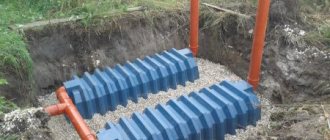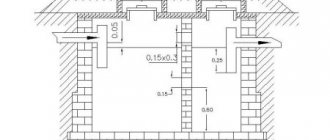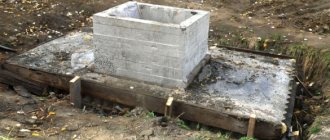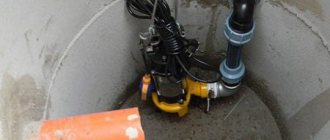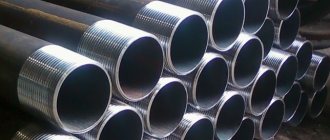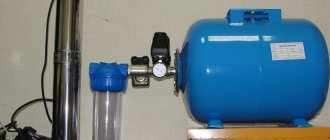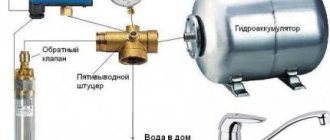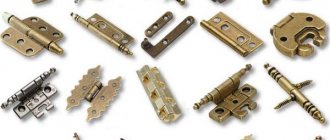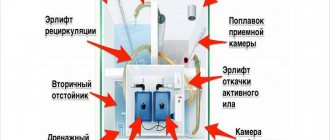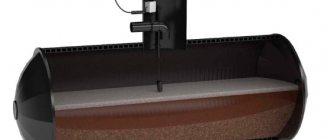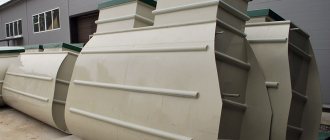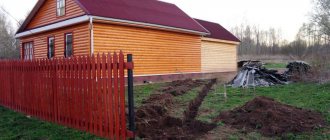Autonomous sewerage is an excellent alternative to traditional cesspools. Installing a septic tank is the most effective solution in cases where it is not possible to connect to a centralized system. The choice of containers for septic tanks is quite large. Often, owners of country houses, cottages, and summer cottages choose plastic or metal tanks. If you don’t want to spend money on building a sewer system, you can build a system with your own hands from reinforced concrete rings, bricks, or even worn-out car tires.
The simplest septic tanks are only suitable for storing wastewater. As soon as the container is full, you need to call a sewage truck and pump out the sewage. More convenient to use are autonomous sewers with soil treatment or deep biological treatment. To set up a full-fledged system, you must first draw up a project, which will include diagrams for the location of wells, connections of pipes and other equipment. Proper implementation of such a project will result in a functional sewer system that will last for many years.
Great!
Submit your answers and receive a personal offer + gift!
The difficulty of choosing is that different options have their pros and cons. What to choose? “A lot” of septic tanks with low efficiency, but for little money, or “few” septic tanks with high efficiency, but at a higher price. To help you get out of Buridan's ass, we've compared the most common types, designs, sizes and prices.
Content
- Types of septic tanks Septic tank made of polypropylene Video: Biofilter
- Septic tank made of polyethylene Polyethylene containers or barrels for sewerage
- 30,000 rubles
Types of septic tanks
Choosing a septic tank for a private home is a strategic question. The range of septic tanks for collecting and treating sewage is wide, and when choosing the optimal design of a septic tank, you must first evaluate its operating conditions, the availability of free space, the groundwater level, as well as the desired degree of wastewater treatment.
The main materials for the manufacture of septic tanks are concrete (concrete rings) and plastic: polyethylene and polypropylene. According to the degree of efficiency of wastewater treatment, septic tanks can be divided into:
Aeration units
Complex technical devices with compressors, aerators and airlifts. Purification degree - 98%;
Biological treatment systems
Septic tanks with pumps and biofilter. Purification degree - 95%;
Overflow septic tanks
Non-volatile septic tanks made of concrete rings or plastic. Degree of purification 60 - 70%;
Storage containers
Pumping out untreated wastewater using a sewer truck as it is filled. Purification degree 0%.
Septic tank made of polypropylene
Septic tank containers, made of durable polypropylene sheets with a thickness of 8-12 mm depending on the volume, are characterized by high resistance to acids and alkalis, zero hydroscopicity and high abrasive resistance. All seam connections are made by extrusion welding with seam quality control. The body of the septic tank made of polypropylene will serve properly for 50 years.
There are cylindrical (round) and square containers on the market. The cylindrical shape of a polypropylene septic tank is optimal for resisting compression by soil, and stiffening ribs and lugs on the base ensure the stability of the structure in the ground.
Video: Biofilter
The high degree of wastewater purification achieved directly inside the housing allows such systems to be called “no pumping” septic tanks.
Septic tank made of polyethylene
Polyethylene septic tanks are made from low-density polyethylene using the rotational molding method, due to which they are immediately seamless. Polyethylene of the LLDPE modification is environmentally friendly and is resistant to aggressive environments and chemical contaminants
It should be noted that during rotational molding, the product may have unequal wall thickness, which can negatively affect the performance properties of the septic tank. In addition, polyethylene has low strength, i.e. In order to avoid damage to the walls of the housing, you must be extremely careful when backfilling the polyethylene septic tank with uncleaned sand.
Polyethylene containers or barrels for sewage
Polyethylene also serves as a construction material for barrels (Eurocubes), which are used for the manufacture of homemade treatment plants.
Septic tank made of polyethylene containers
When living seasonally in a country house and with a small number of users, the owners sometimes simply dig several plastic barrels into the ground into which household waste flows. Sometimes drainage holes are made in barrels or the bottom is cut off altogether to allow wastewater to seep through the ground. Such containers do not have stiffeners and in order to avoid being compressed by the soil, it is necessary to strengthen the walls of the pit with bricks, car tires or concrete.
The storage tank is pumped out as it fills. The disadvantages of such a cleaning system include not only the high costs of frequent sewage disposal and the danger of environmental pollution due to overfilling of the container, but also design imperfections that result in unpleasant odors spreading throughout your area.
Advantages of plastic septic tanks
So, the main advantages of plastic septic tanks for a private home include:
Price
You can buy a septic tank at a relatively low price compared to other tanks that additionally require equipment for post-treatment systems;
Dimensions
Small overall dimensions and weight. Due to its light weight, a plastic septic tank is easy to transport and install. Three people can easily handle the installation of such a septic tank without the use of a crane. The body of a factory-made plastic septic tank is divided into three compartments, in which wastewater is sequentially settled and clarified. Due to the fact that wastewater treatment occurs inside the station, there is no need to allocate space on the site for massive wastewater treatment facilities;
Completely sealed
If the groundwater in your area is located high, then a septic tank made of reinforced concrete rings will not be able to provide a sufficient level of tightness;
Durability
Guaranteed service life - 50 years. Plastic septic tanks do not corrode like metal ones and, unlike concrete ones, have excellent resistance to aggressive environments.
Modern polymer compositions are environmentally friendly, retain their performance properties at temperature fluctuations from −50°C to +100°C and do not absorb water.
Flaws
The light weight of plastic is both an advantage and a disadvantage. It should be remembered that a lightweight hull can be pushed out by rising groundwater or heaving soil if there is no water in it. To avoid such troubles, it is forbidden to keep the septic tank empty - it must always be filled with water.
Peculiarities
For the productive functioning of a septic tank using bacteria, you should follow the recommendations
- Do not dispose of waste down the drain
- Avoid one-time large volumes of wastewater (pool drainage)
- Do not use aggressive detergents or cleaning agents
- Do not allow toxins or medications to enter the septic tank.
If these requirements cannot be met for one reason or another, it is recommended to add bacteria every three days to ensure a sufficient colony.
Price for septic tanks
The cost of a turnkey septic tank consists of the price of the septic tank itself, the cost of installation, the cost of wastewater treatment and subsequent maintenance. For example, let’s take buildings designed for 3 people (with a productivity of 0.6 m3 per day) and we get 4 price categories.
30,000 rubles
Construction of a septic tank from three concrete rings will cost you an average of 30 thousand rubles. Their installation will require the use of a crane and free space on the site.
The prefabricated structure does not guarantee complete tightness of the containers - it is possible for untreated wastewater to seep into the ground and fill the septic tank with groundwater. Additional costs will be required for the purchase and installation of plastic sealed inserts.
Installation requires additional costs for the rental of special equipment and the purchase of waterproofing materials. Installation time is 2-3 days.
45,000 rubles
An overflow, non-volatile septic tank made of polyethylene with three compartments costs from 45 thousand rubles without taking into account the equipment of wastewater treatment systems. Requires additional treatment of clarified wastewater through a sand and gravel bed or pouring water into a drainage well.
Once a year it is necessary to remove sedimentary contaminants using a sewer truck. No special equipment is needed during installation; installation time is 1 day.
60,000 rubles
A local sewerage station made of polypropylene with three compartments, a pump and a biofilter will cost from 60 thousand rubles. Electricity is required to power the recirculation pump. A timer for pump operation is included.
Due to the high degree of biological decomposition of coarse contaminants, sludge removal can be carried out every 2 years. The pumped out sludge can be stored in a compost pit and used as fertilizer after fermentation. No special equipment is needed during installation; installation time is 1 day.
70,000 rubles
The aeration unit is made of corrosion-resistant monolithic sheet polypropylene and is the most effective treatment facility providing deep biological treatment of domestic wastewater.
It is equipped with an aeration compressor and airlifts for supplying wastewater to the aeration tank and removing sludge from the settling tank; there are modifications with an additional biofilter. Requires electricity supply. Cost - from 70 thousand rubles. Maintenance: once a year, clean the airlifts and compressor filters, once every 2 years, pump out solid sediment with a fecal pump or a sewer truck.
Article: 2230845-271
Eurolos PRO 3
Aeration biological treatment plant
- Capacity 0.6 m³ per day
- Cleans up to 600 liters of wastewater per day
73,500
rubles
Price of septic tank
Article: 2270390-1113
Eurolos GRUNT 4+
Autonomous sewerage system for high groundwater level
- Capacity 0.8 m³ per day
- Cleans up to 800 liters of wastewater per day
113,000
rubles
Price of septic tank
Article: 2270390-1114
Eurolos GRUN 5
Autonomous sewerage system for high groundwater level
- Capacity 1 m³ per day
- Purifies up to 1000 liters of wastewater per day
117,000
rubles
Price of septic tank
Article: 2230843-180
Eurolos BIO 3+
Local wastewater treatment plant
- Capacity 0.6 m³ per day
- Cleans up to 600 liters of wastewater per day
75,500
rubles
Price of septic tank
Article: 2230843-182
Eurolos BIO 4+
Local wastewater treatment plant
- Capacity 0.8 m³ per day
- Cleans up to 800 liters of wastewater per day
77900
rubles
Price of septic tank
Article: 2230845-274
Eurolos PRO 4+
Aeration biological treatment plant
- Capacity 0.8 m³ per day
- Cleans up to 800 liters of wastewater per day
85,500
rubles
Price of septic tank
Article: 2230845-276
Eurolos PRO 5+
Aeration biological treatment plant
- Capacity 1 m³ per day
- Purifies up to 1000 liters of wastewater per day
91,000
rubles
Price of septic tank
Article: 2270390-1111
Eurolos GRUNT 3+
Autonomous sewerage system for high groundwater level
- Capacity 0.6 m³ per day
- Cleans up to 600 liters of wastewater per day
106,000
rubles
Price of septic tank
What is a septobak?
Definition
A septic tank is a sealed container for storing and purifying human waste products. The septic tank is made from polyester fiberglass with the addition of glass reinforcing material and polyester resin. The manufacturing material complies with GOST 19170-2001.
Device
The entire system consists of two parts: the container itself and the underground drainage filter.
By purchasing a septic tank in the kit you receive:
Fiberglass storage- Three service ports with a diameter of 169mm
- Two pipes for inlet and outlet
- Passport
- Operation manual
- Septic tank warranty coupon
Attention! The Bio model comes with 1.5-2 necks. It is worth noting that it is possible to order neck extensions and plugs.
Water quality after additional drainage treatment
| Hygienic characteristics of wastewater | ||
| Ingredients | Before cleaning | After cleaning |
| BOD5, mgO2/l | 65,0 | 2,0 |
| COD, mgO2/l | 320,0 | 19,0 |
| Petroleum products, mg/l | 0,85 | 0,23 |
| Suspended substances, mg/l | 215,0 | 2,0 |
| pH, units | 6,9 | 7,2 |
| Surfactant, mg/l | 1,5 | 0,11 |
BOD – biological oxygen demand. The oxygen content in water is responsible for the rate of oxidation of substances, and, accordingly, the rate of decomposition of compounds.
Comparative characteristics
The range of septic tanks for collecting and treating sewage is very wide, including price. When choosing, you must first evaluate the conditions of its operation: the availability of free space, the groundwater level on the site, as well as the desired productivity and degree of wastewater treatment.
| Septic tank made of concrete rings | Polyethylene septic tank / container | Polypropylene septic tank | Aeration unit | |
| Manufacturing method | Assembly from ready-made reinforced concrete rings and slabs. | Rotational molding. No seams. | From a monolithic sheet. Welds. | From a monolithic sheet. Welds. |
| Wall thickness | 80-100 mm | ~3-10 mm due to the peculiarities of the technical process | 8-12 mm depending on the volume of the septic tank. | 8-80 mm depending on the volume of the septic tank |
| Tightness | Not guaranteed | Guaranteed | Guaranteed | Guaranteed |
| Power supply | Not required | Not required | To power pumps | To power the pump and compressor |
| Preservation for the winter during long periods of inactivity | Not required | Not required | Required | Required |
| Installation time and complexity | The use of special equipment and waterproofing materials is required. 2-3 days | No special equipment needed. 1 day. | No special equipment needed. 1 day. | No special equipment needed. 1 day. |
| Degree of wastewater treatment | 60% | 70% | 95% | 98% |
| Additional treatment of wastewater with soil | Required | Required | Not required | Not required |
| Service | Regular pumping, washing and re-arrangement of soil tertiary treatment systems is required | Requires periodic pumping and flushing of post-treatment systems with soil | Requires initial loading of biological product and periodic pumping of harmless sludge | Requires periodic cleaning of airlifts and pumping out harmless sludge |
| Septic tank area occupied on the site, m2, taking into account post-treatment | 12.5 m2 (3 rings Ø180cm triangle) | 8 m2 with drainage field | 1 m2 with drainage into a ditch, 3 m2 with a drainage well | 1 m2 with drainage into a ditch, 3 m2 with a drainage well |
| Price | From 30,000 rubles | From 45,000 rubles | From 60,000 rubles | From 70,000 rubles |
Warranty
The manufacturer is .
- The warranty period for the product is 5 years from the date of purchase.
- The warranty period for the installation work performed is established by the organization that carried out the installation.
- The warranty does not apply to a treatment facility that has received mechanical damage due to the fault of the user.
- The warranty does not apply to a wastewater treatment plant that has been damaged due to use contrary to the instructions in this manual.
- The warranty does not apply to materials used during installation work.
- The warranty does not apply to additional equipment used in the operation of the treatment plant.
